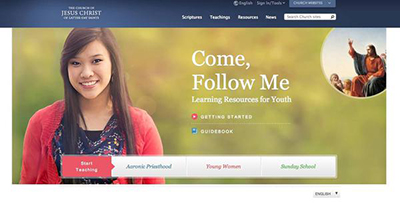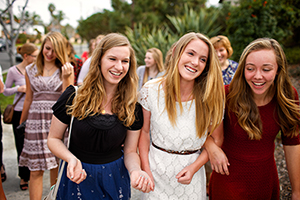Ask Good Questions to Get Youth to Participate in Class
Contributed By Marianne Holman Prescott, Church News staff writer

Classes during church on Sunday, December, 16, 2012, take part in the new LDS youth curriculum.
Article Highlights
- Never answer your own question.
- Don't be afraid of silence; intelligent comments and answers take time to formulate.
- Rephrase long, complicated questions and accept every answer.
- Use three levels of questions—low, medium, and high—to help students search, analyze, and apply.
Related Links
Learning to ask good questions that lead to meaningful participation is one of the most important aspects of effective teaching, Mark E. Beecher taught during a presentation at BYU’s Campus Education Week on August 21.
After more than a year of instruction using the youth curriculum, Come Follow Me, teachers and students are working together to create an atmosphere where both are able to participate in the learning and teaching process.
Drawing from the experience and words of President Harold B. Lee, Brother Beecher said, “He expressed his deep concern about the fact that some of [the youth] could go through Primary, Sunday School, Mutual, priesthood quorums, and seminary and come out the other end without testimonies. He said, ‘Do you know why I think it is? Because our young people have grown up spectators.’”
In order to ensure the youth are not becoming “spectators,” Brother Beecher shared ideas and tips for teachers to facilitate learning by the Spirit in their Sunday classrooms.
“The first five minutes of the lesson makes all the difference,” said Brother Beecher, who works as a principal for Seminaries and Institutes of Religion. “You need an attention getter.”
Whether it is a simple object lesson, question, or activity, something that brings the class together—getting students out of their own world and into the world of the teacher—will set the tone for the rest of the class. From there, they are able to create an environment that invites the Spirit and allows students to participate.
One way teachers facilitate participation is through asking effective questions, taught Brother Beecher. In order to ask good questions, teachers need to be prepared through study and prayer as they think of the needs of their students so they are able to identify the doctrine or principle they would like to teach. He also identified specific ground rules for teachers to follow when asking questions.
Never answer your own question
“First, never answer your own question!” he said.

The Come, Follow Me website for youth.

Latter-day Saint youth.

Come, Follow Me youth curriculum manual.
Oftentimes teachers get nervous and start answering their own questions. Brother Beecher encouraged teachers to not be afraid of silence, because “it takes time to formulate an intelligent comment or answer.”
Rephrase questions and accept every answer
If the question is too long or confusing, rephrase it, he said. It is also important to find ways to accept every answer—even wrong ones—in a way that increases participation and creates an atmosphere of safety. It is important to encourage participation while still taking into account the students who need bounds.
“Use techniques to involve the more quiet students and limit the more talkative ones,” he said.
He said that often a class has one student who can overpower the other students. In that case, he will often talk to the vocal student and say he will invite the student to share during the lesson—and he follows through with that.
Avoid “yes” and “no” questions
Part of using effective questions includes asking questions that don’t have an obvious answer but that aren’t so difficult that it is beyond the student’s capacity to know the answer. It is important to avoid “yes” and “no” questions.
“You teach and clarify doctrine, allow the students to comment on individual adaptations,” he taught.
He spoke of three levels of questions:
1. Low: Low-level questions are those that can be answered by searching for the answer in the scripture block. They tend to ask who, what, when, where, how, and why and can be found within the text the students are reading.
2. Medium: Mid-range questions are those that ask the student to analyze information that is within the scripture block. They help students understand more broadly and deeply and invite them to think about the meaning of the principle. Such questions as “Why do you think ... ?” and “What do you think that means?” help students to dig a little deeper.
3. High: Questions that encourage students to feel and apply the doctrine to their own lives are high-level questions. They have the student synthesize information and make personal applications or bear testimony of gospel principles. Teachers encourage students to reflect on spiritual experiences and lead them to feel the significance of gospel principles as they find ways to apply them to their lives. These questions have more than one answer and are very personal.
Since low-level questions are easier and more specific, teachers are able to help students ease their way into the lesson.
Mid-range questions get them thinking about the meaning of their answers, and the high-level questions invite students to think about how the doctrine relates to them.
As teachers build upon the three types of questions throughout their lessons, they are able to foster an environment for students—and teachers—to learn the doctrine and apply it to their own lives.
